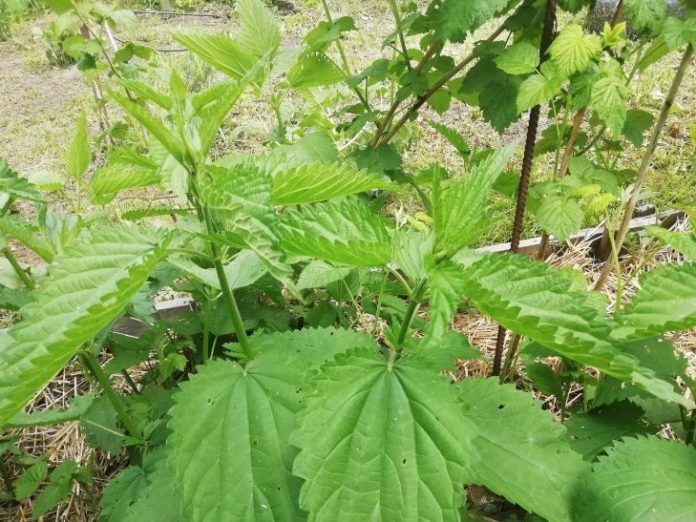Nettle fertilizer, known for its effectiveness, is not always a universal solution for gardeners..
Some plants show unexpected sensitivity to this seemingly harmless organic product. .
Understanding their characteristics will help avoid mistakes in garden care.
Characteristics of nettle fertilizer
Nettle fertilizer has earned popularity among gardeners due to its rich composition.
It contains nitrogen, potassium, calcium, magnesium and many microelements necessary for healthy plant growth. However, it is precisely this wealth that can become a problem for some crops.
The high nitrogen content in nettle infusion promotes vigorous growth of green mass. For many vegetable and ornamental plants, this is an advantage, but not for all.
Some species, with excess nitrogen, can reduce their yield or worsen the quality of the fruit.
Legumes
Legumes such as peas, beans, lentils and soybeans do not require additional nitrogen nutrition.
These crops are able to independently fix atmospheric nitrogen due to symbiosis with nodule bacteria on their roots.
Using nettle fertilizer can disrupt this natural process and lead to excessive growth of green mass to the detriment of fruiting.
Root crops and bulbs
Carrots, beets, turnips and other root crops also react negatively to excess nitrogen.
When using nettle fertilizer, these plants can form abundant tops, but the roots will remain small and deformed.
A similar situation is observed with onions and garlic – excess nitrogen provokes the growth of feathers, but reduces the size of the bulbs.
Tomatoes and peppers
Although tomatoes and peppers usually respond well to organic fertilizers, you need to be careful with nettle fertilizer.
Excessive use can lead to lush foliage growth at the expense of flowering and fruit set. In addition, tomatoes may experience a delay in fruit ripening.
Fruit trees and berry bushes
It is better not to feed young fruit trees and berry bushes with nettle infusion in the first years after planting.
Excess nitrogen can stimulate the growth of shoots that will not have time to lignify before the onset of cold weather and will suffer in winter.
In adult plants, such feeding can cause the ovaries to fall off and reduce winter hardiness.
Plants that prefer acidic soils
Plants that prefer acidic soil, such as rhododendrons, azaleas, blueberries and bilberries, can react negatively to nettle fertilizer.
It has an alkaline reaction and can change the acidity of the soil, which will lead to deterioration of the condition of these crops.
When using nettle fertilizer, these plants can form abundant tops, but the roots will remain small and deformed.
A similar situation is observed with onions and garlic – excess nitrogen provokes the growth of feathers, but reduces the size of the bulbs.
Tomatoes and peppers
Although tomatoes and peppers usually respond well to organic fertilizers, you need to be careful with nettle fertilizer.
Excessive use can lead to lush foliage growth at the expense of flowering and fruit set. In addition, tomatoes may experience a delay in fruit ripening.
Fruit trees and berry bushes
It is better not to feed young fruit trees and berry bushes with nettle infusion in the first years after planting.
Excess nitrogen can stimulate the growth of shoots that will not have time to lignify before the onset of cold weather and will suffer in winter.
In adult plants, such feeding can cause the ovaries to fall off and reduce winter hardiness.
Plants that prefer acidic soils
Plants that prefer acidic soil, such as rhododendrons, azaleas, blueberries and bilberries, can react negatively to nettle fertilizer.
It has an alkaline reaction and can change the acidity of the soil, which will lead to deterioration of the condition of these crops.
When using nettle fertilizer, these plants can form abundant tops, but the roots will remain small and deformed.
A similar situation is observed with onions and garlic – excess nitrogen provokes the growth of feathers, but reduces the size of the bulbs.
Tomatoes and peppers
Although tomatoes and peppers usually respond well to organic fertilizers, you need to be careful with nettle fertilizer.
Excessive use can lead to lush foliage growth at the expense of flowering and fruit set. In addition, tomatoes may experience a delay in fruit ripening.
Fruit trees and berry bushes
It is better not to feed young fruit trees and berry bushes with nettle infusion in the first years after planting.
Excess nitrogen can stimulate the growth of shoots that will not have time to lignify before the onset of cold weather and will suffer in winter.
In adult plants, such feeding can cause the ovaries to fall off and reduce winter hardiness.
Plants that prefer acidic soils
Plants that prefer acidic soil, such as rhododendrons, azaleas, blueberries and bilberries, can react negatively to nettle fertilizer.
It has an alkaline reaction and can change the acidity of the soil, which will lead to deterioration of the condition of these crops.
When using nettle fertilizer, these plants can form abundant tops, but the roots will remain small and deformed.
A similar situation is observed with onions and garlic – excess nitrogen provokes the growth of feathers, but reduces the size of the bulbs.
Tomatoes and peppers
Although tomatoes and peppers usually respond well to organic fertilizers, you need to be careful with nettle fertilizer.
Excessive use can lead to lush foliage growth at the expense of flowering and fruit set. In addition, tomatoes may experience a delay in fruit ripening.
Fruit trees and berry bushes
It is better not to feed young fruit trees and berry bushes with nettle infusion in the first years after planting.
Excess nitrogen can stimulate the growth of shoots, which will not have time to lignify before the onset of cold weather and will suffer in winter.
In adult plants, such feeding can cause the ovaries to fall off and reduce winter hardiness.
Plants that prefer acidic soils
Plants that prefer acidic soil, such as rhododendrons, azaleas, blueberries and blueberries, may react negatively to nettle fertilizer.
It is alkaline and can change the acidity of the soil, leading to the deterioration of these crops.


